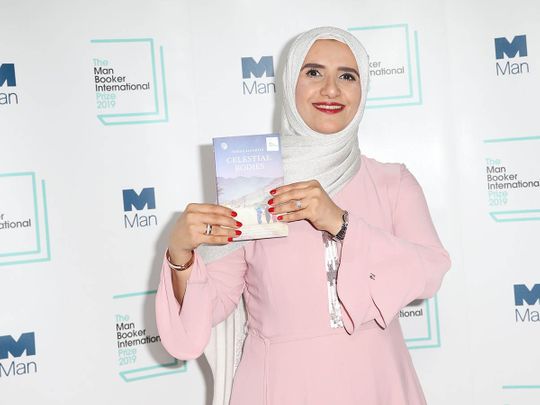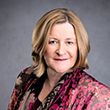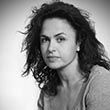
London: Jokha Alharthi on Tuesday became the first Arabic author to win the Man Booker International prize for her novel “Celestial Bodies” which reveals her Omani homeland’s post-colonial evolution.
Alharthi, 40, is the author of two previous collections of short fiction, a children’s book and three novels in Arabic.
She studied classical Arabic poetry at Edinburgh University and teaches at Sultan Qaboos University in Muscat.
The prestigious £50,000 (Dh233,342) prize, which celebrates translated fiction from around the world, is divided equally between the author and translator.
Alharthi’s translator was US academic Marilyn Booth, who teaches Arabic literature at Oxford University.
The judges said Alharthi’s book was “a richly imagined, engaging and poetic insight into a society in transition and into lives previously obscured”.
The book is set in the village of al-Awafi in Oman where we encounter three sisters: Mayya, who marries Abdallah after a heartbreak; Asma, who marries from a sense of duty; and Khawla who is waiting for her beloved who has emigrated to Canada.
The three sisters witness Oman’s evolution from a traditional, slave-owning society to a complex modernity.
“Elegantly structured and taut, it tells of Oman’s coming-of-age through the prism of one family’s losses and loves,” the organisers said in a statement.
The Guardian said it offers “glimpses into a culture relatively little known in the west”.
Jury chair Bettany Hughes said the novel showed “delicate artistry and disturbing aspects of our shared history”.
“The style is a metaphor for the subject, subtly resisting cliches of race, slavery and gender,” she said.
Alharthi was up against five other shortlisted authors: France’s Annie Ernaux, Germany’s Marion Poschmann, Poland’s Olga Tokarczuk, Colombia’s Juan Gabriel Vasquez and Chile’s Alia Trabucco Zeran.
Here are some reactions from the literary community:

I think it’s wonderful recognition of the excellent writing that’s going on this region. It gives everyone hope that they will not be forgotten, the Gulf region has been recognised and this will give other young writers encouragement. Like when Nagoub Mahfouz became the first Arab to win the Nobel Prize for Literature in 1988, it will make a huge difference to output and positivity among the local literary community. Books in translation are also so important as they allow us to tap into world literature and have a better understanding of other cultures and ways of life.

I’ve always believed that Arab literature and art is up there competing at a global standard, historically it’s always been that way, but to finally have the first Arab win a Booker prize, that too by the first Omani woman to have her works translated, is huge. I’m sure this will be a gateway to more authors from the region getting translated and these are exciting times if you are a young upcoming Arab writer as it shows you don’t need to be writing for years to get noticed. If you are talented, have a message and a story to tell, the platform is there.

I’m so thrilled because it sheds a lot of light on the region and what it has to offer, so this is a win for all of us in a sense. On a personal level, I’m part of a collective of writers and it’s just incredible to have that visibility on literature in the region now. The GCC has always been home to storytellers and poets, it’s a big part of our culture and identity. Definitely, without doubt, this will open a lot of doors of opportunity and I can’t wait to see what the future holds for other local writers

The reality is that there are many great writers in this region but due to the lack of translation it doesn’t get the exposure it deserves. Hopefully this is the beginning and people will begin to take notice of Arab writers. There’s a bit of stigma around Arab writing. People think they are not experienced or talented enough to tackle great subjects and tell them in an interesting way, that’s the perception in the west, but for those who know, this region is a great untapped resource, with proud heritage of storytelling that’s only known here.

It’s fantastic to see Arab literature by Arab women receive such mainstream attention. I try to avoid all sweeping statements about what it means as how would I know? But generally speaking when an Arab female wins a prize writers from the region are more seen and it really is empowering. That’s not to say people aren’t reading Arab literature as they certainly are, but it’s always nice to see when authors from the margins, if you might call them, receive mainstream attention. It’s empowering, you feel more seen and its fantastic for Arab literature and Arab women

The novel is a relatively new form in the Arab world, compared to poetry and Arab writers have only recently started to be given the recognition they deserve. Jokha Al Harithy’s award will not only enhance the position of Arab writers globally, particularly Arab women writers, but also draw attention to the beauty and nuance of the Arabic language and the complexity of Arab history. Credit also deservedly goes to the translators, like Marilyn Booth, who have worked tirelessly for years to bring the voices of Arab writers, particularly those of female novelists, to the attention of English language audiences.












